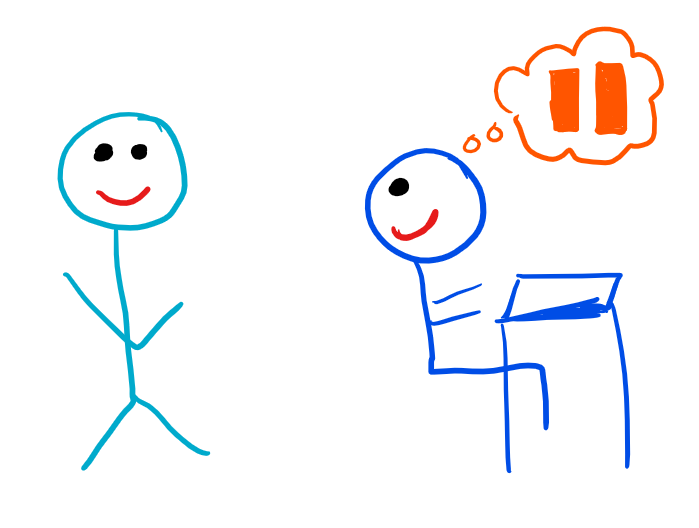
We keep typing while we speak. We respond efficiently, directly, and we just tell them what to do. (Btw – same thing goes if you’re on the phone. We know you’re typing / reading your emails / writing an unrelated post-it at the same time. Please don’t. It hurts – our relationship and my performance. Thanks!)
What impact does this have on performance? On our own performance? We lose our train of thought anyway due to the distraction, but it takes more energy to find it again, and we experience a sense of frustration at our team members.
For our team members,
Did we intend any of these things? No!
Does this help our work towards our bigger goals in any way? Absolutely not!
And yet, in that moment we feel like we are being more efficient, getting more done, “multi-tasking”. We’re actually under-performing on our own work, and damaging relationships with our team members.
What would happen if you turn around and look at them?
But I don’t have enough time Amy!
Really? I think you don’t have enough time not to.
What happens if we have let them know we will be with them in a moment, capture and finish our thought, then turn and look at them? To fully engage in that conversation in that moment?
What would happen for you if each time a team member came over, you paused? Wrapped up your thought. Moved your body. Looked them in the eye and gave them your full attention.
For one of my clients this week he did just this. Within a week he saw a shift in his relationships with his team members - and their performance, and their confidence, shifted at the same time.
We MUST connect human to human first. Whether that’s in a meeting, when we’re solving a complex problem, or just going about our day-to-day business. We must connect with those humans we work with, whether by eye contact, a genuine hello acknowledgement, or checking in with how they are. Those extra moments give us a continuing and ongoing benefit for our relationship, and their performance. It also saves our own brain from jumping randomly, and reduces the power of the negative emotions of frustration or anger.
Giving us more energy, better performance. A win-win every day.

We keep typing while we speak. We respond efficiently, directly, and we just tell them what to do. (Btw – same thing goes if you’re on the phone. We know you’re typing / reading your emails / writing an unrelated post-it at the same time. Please don’t. It hurts – our relationship and my performance. Thanks!)
What impact does this have on performance? On our own performance? We lose our train of thought anyway due to the distraction, but it takes more energy to find it again, and we experience a sense of frustration at our team members.
For our team members,
Did we intend any of these things? No!
Does this help our work towards our bigger goals in any way? Absolutely not!
And yet, in that moment we feel like we are being more efficient, getting more done, “multi-tasking”. We’re actually under-performing on our own work, and damaging relationships with our team members.
What would happen if you turn around and look at them?
But I don’t have enough time Amy!
Really? I think you don’t have enough time not to.
What happens if we have let them know we will be with them in a moment, capture and finish our thought, then turn and look at them? To fully engage in that conversation in that moment?
What would happen for you if each time a team member came over, you paused? Wrapped up your thought. Moved your body. Looked them in the eye and gave them your full attention.
For one of my clients this week he did just this. Within a week he saw a shift in his relationships with his team members - and their performance, and their confidence, shifted at the same time.
We MUST connect human to human first. Whether that’s in a meeting, when we’re solving a complex problem, or just going about our day-to-day business. We must connect with those humans we work with, whether by eye contact, a genuine hello acknowledgement, or checking in with how they are. Those extra moments give us a continuing and ongoing benefit for our relationship, and their performance. It also saves our own brain from jumping randomly, and reduces the power of the negative emotions of frustration or anger.
Giving us more energy, better performance. A win-win every day.